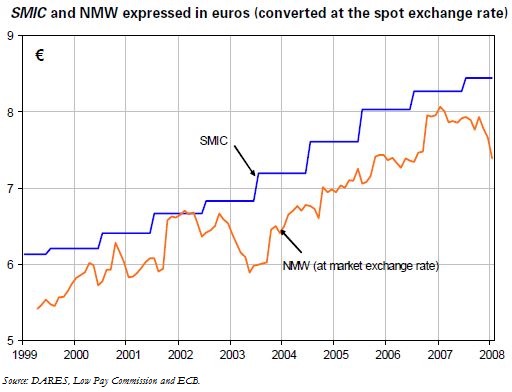Trésor-Economics No. 31 - How does the National Minimum Wage compare with the SMIC?
The British National Minimum Wage (NMW) was introduced in 1999 and rapidly rose to a level close to that of its French equivalent, the Salaire Minimum Interprofessionnel de Croissance, or SMIC. However the NMW has not affected the operation of the labour market in the same way as the SMIC. At first sight, the proportion of workers covered by this minimum wage is distinctly lower in the United Kingdom than in France, and the wage distribution appears to be less constrained by its existence.
Leaving aside institutional differences such as the scope of application, the basis for calculation, and revision procedures (although these are not to be overlooked), more detailed scrutiny yields deeper insight into this paradox. From the employee's point of view, when redistribution is taken into account, the living standards of a worker on the minimum wage are pretty much comparable on either side of the Channel. Moreover, precise comparison shows that, when measured using the same methods, the proportion of employees effectively earning the SMIC is considerably greater than that of employees earning the NMW, but that the difference is less than the share of workers directly affected by the SMIC (12.9%) would suggest. Concerning the cost of labour, the hourly cost of workers paid at the level of the British minimum wage is distinctly less than at the level of the SMIC (more than 10% less in absolute terms). This is also the case in relative terms, an hour of work at the minimum wage representing less than 34% of the cost of labour at the average wage in the United Kingdom, versus 39% in France.
The relative newness of the NMW is probably an important factor in any attempt to compare the respective roles of the NMW and the SMIC in the current operation of the British and French labour markets. That is because the NMW is less than 10 years old and the UK had never before had a legal minimum wage applicable to the entire economy, whereas the SMIC has been in existence for nearly 50 years.
More particularly, the Low Pay Commission (which is responsible for administering the NMW) seeks to confine the NMW to a small percentage of British workers and to preserve its status as a "floor" in the wage distribution. In contrast, the SMIC in France appears to act as the wage norm.
